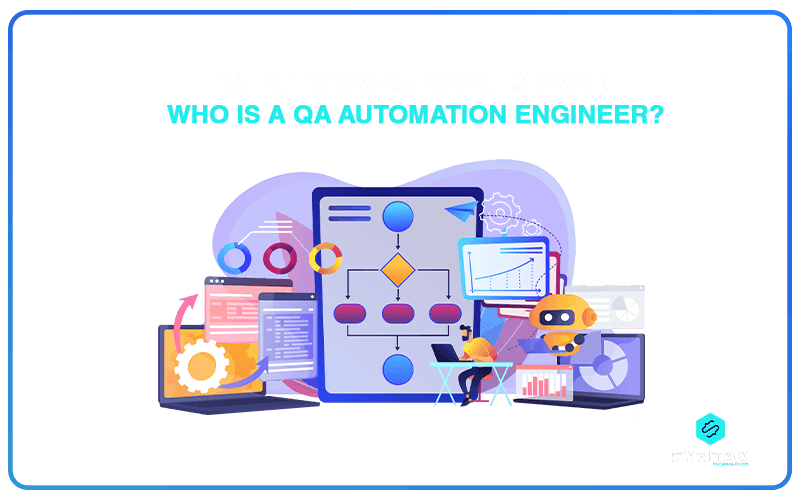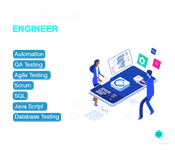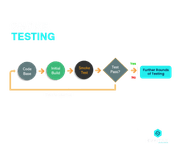Everything that can be Automated; Will be Automated. – Robert Cannon
Software Development is a highly competitive market. Organizations need to not only ensure the quality of the end-product, but they are equally required to timely respond to the needs of the market. While the first requirement is guaranteed through QA Testing; the second requirement is ensured through automating the testing process of QA Software Testing.
Thus, when you are pressurized to test every piece of software rigorously before the end product is released into the market as well as is required to release updates of your product, faster than ever into the market; it is QA Automation Testing which comes to your rescue.
So what is QA Automation? What is QA Automation Engineer? What is QA Automated Testing? Let us find out.
In this blog, we shall try and provide answer to the question of what is QA Automation. Additionally, we shall look at what is QA Automation Engineer. Consequently, we shall elaborate on this process of QA Testing by trying to understand what is Automation Testing in QA.
What is Software Development Life Cycle?
Before we delve into understanding the different forms of software testing, it is important to understand the Software Development Cycle in general.
Software Development Life Cycle (SDLC) is a process used by development teams to plan, design, develop and test high-quality software. It emphasizes the structuring of activities performed during the entire life cycle of a system or application project which includes the planning, analysis, design, implementation, testing, deployment and maintenance processes.
The SDLC defines how each phase of the process will be conducted in order to ensure that all project requirements are met. It also helps provide structure and guidance throughout the development process so that teams can focus on delivering a quality product within budget and timeline constraints.
What is QA Automation Testing?
In this section, we shall look at what is QA Automation.
QA Testing is the procedure of evaluating and assessing whether a software service or product fulfils a company’s or industry’s quality requirements or not. As the name suggests, QA Testing is all about assuring the best possible and highest quality of end product for the consumers.
The benefit of QA Testing lies in maintaining standard procedures for ensuring the quality of software product and helping the software team to deliver consistent results. These quality benchmarks serve as yardsticks for determining whether an organization is meeting its desired objectives or not. So if this is QA Testing, what is Automated Testing in QA?
When QA Testing is carried out with the help of Automated Testing Tools for automating the process of execution of tests on the software being developed, it is referred to as QA Automation Testing.
The process helps in lifting off much of the burden from the shoulders of manual testers who, no longer need to perform time consuming repetitive tasks. QA Automation Testing is highly beneficial for continuous delivery, deployment and integration.
Looking to get a better understand of QA Testing, do read our blog on What is QA Testing: Everything you need to know about Assuring Quality in Software Testing.
What is QA Automation Engineer?
In this section, we shall look at a very important part of this process of QA Automation Testing; and that is the professional referred to as the QA Automation Engineer. So what is a QA Test Automation Engineer?
A QA Automation Engineer or Quality Assurance Automation Engineer is the one who is responsible for designing automated tests for evaluating and assessing the functionality of mobile and web applications.
Their task begins with creation of preliminary test designs, after which they move on to writing test scripts, installing automation testing protocols and consequently reporting the results. Thus, with the help of different test automation tools, QA Automation Engineers help in designing, testing and deploying test automation solutions.
In essence, as you seek to understand what is QA Automation Engineer, you should remember that he is an individual who is responsible for automating tests as well as assuring quality. Thus, he determines whether the product meets architectural requirements, automate tests for software validation, work in liaison with validation engineers and firmware developers as well as guarantees high quality of the system.
Roles and Responsibilities of a QA Automation Engineer
- Writing test scripts and executing automated tests
- Working in tandem with the design team for discussing verification protocols
- Taking account of errors in the tracking system
- Maximising test coverage as well as evaluating the priority of test scenarios and creating execution plans accordingly
- Coming up with appropriate automation solutions as per the needs of the client
- Determining the viability of automating specific tests
- Building test automation frameworks and setting up continuous integration
- Working in collaboration with different teams in order to find ways by which automation can boost productivity and workflow
- Design and installation of software databases
What is Automation in QA: Difference with QA Manual Testing
In this section, we shall look at what is QA Automation Testing in terms of the difference between QA Manual and QA Automation Testing.
QA Automation Testing relies on specific test automation tools and test automation frameworks, which help in the execution of tests and generation of results. QA Manual Testing makes use of written test plans wherein the tests are manually executed by testers and the defects are reported to the developers.
When it comes to QA Testing, Manual Testing is considered suitable for evaluating the user experience (UX) as well as the feel and look of an application. This is because, such an assessment is best conducted by humans alone. Hence QA Manual Software Testing is often preferred for test cases with varying requirements as well as newly-designed test cases.
In case of QA Automated Testing, the framework is created by testers, on which automation tests are run. It is preferred for large scale software testing, especially for regression tests which are highly repetitive in nature.
One of the major benefits of Automation Testing in QA is that the software testing process can be recorded and the test scripts are reusable. This is beneficial for repeated test execution.
What is Automation Testing in QA: The Automated QA Testing Process
It will be futile to try to understand what is QA Automation, without paying heed to the process by which QA Automation Testing is conducted. Let us look at some of the important steps.
- Determining the scope of automation by considering its viability: Software testing can be conducted in a manual as well as in an automated fashion. However, there are certain kinds of tests which are best performed in an automated manner, while some kinds of test execution are suited to be conducted manually. Thus, it is important to conduct a feasibility analysis which will help you determine the viability of automating tests in certain scenarios.
- Opting for the right QA Automation Testing Tools: This is an important consideration and while your choice, would to a large extent depend on web app technology under test; it is equally important to pay attention to certain other factors as well. This includes factors like cost, intuitiveness, functionality, UI transparency and usability, possibility of integration with other tools, options for multi-language scripting and so on.
- Formulating Strategy: At this stage, the testing team will be responsible for defining the approach and the ultimate objective of the testing project. Additionally, it will be required to opt for an appropriate framework which would encompass testing tools, common practices and standards.
- Setting up the Environment: Choice of the right environment for testing is crucial for enhancing the test coverage. It will be important for the QA Automation Testers to schedule and keep track of test environment setup activities such as installing hardware and software, along with designing test bed scripts.
- Writing Test Scripts: This is the stage wherein QA Automation Engineers are required to write test scripts, along with automation test scripts for executing test cases, based on scripting standards and actual requirements. It is important to ensure that test scripts are structured, reusable and comprehensible.
- Executing Test Cases: The process of QA Testing can be carried out in two ways:
API Testing: Applications which do not have a Graphic User Interface (GUI), needs to be tested at the message layer and thus the Application Programming Interface (API) Testing is conducted.
GUI Testing: It is a form of QA Testing which copies user experience. For instance, the testing might involve a series of keystrokes and mouse clicks in order to make sure that the program is running smoothly. - Reporting Results: At the end of the execution of test cases, the test automation tools help in automatic generation of test reports which are produced after careful analysis. It gives a detailed account of identified defects and bugs and accordingly determine the viability of further testing.
What is QA Automation: Types of Automated Tests
In general QA Automation Testing is preferred for the following types of tests.
Regression Tests: Regression Testing is a kind of repeated execution testing. These kinds of tests involve the testing of repetitive tasks and there are frequent code changes, which render it extremely difficult to be performed with the help of human resources.
Performance Testing: This type of testing is used for evaluating the stability, scalability and/or speed attributes of the application under test.
Unit Testing: The unit tests are conducted to test a single module or an individual unit in terms of its functionality.
Functional Testing: Functional Tests seek to determine whether the given software product is being able to perform the set of functions as specified in the requirement documentation or not.
Performance Testing: These tests help in assessing the reliability, stability and speed of a software product under a particular level of workload.
Integration Testing: As the name suggests, these tests are conducted in order to evaluate multiple components. It helps in assessing how the software works as a whole.
Smoke Testing: It is executed in the early stages of the SDLC and is carried out on initial builds. The objective is to guarantee the seamless working of the core functionalities. It does not involve deep testing. However, by way of investigating the critical areas of an application, Smoke Testing helps in identifying poor builds in the primary stages itself.
Benefits of QA Automation
Advantages of QA Automation
- Fastening the Testing Process and hence saves time
- Higher Reliability and Level of Accuracy
- Expansion of Test Coverage, resulting in better Quality of Products
- There is possibility of Double Checking by getting the results cross-checked through Manual Testing
- Test scripts are Reusable
- Possibility of bug detection, right in the early stages of development itself which results in shorter SDLC
- Provides for web application testing on all browsers as well as reduces dependency on software testers
- Tests can be run continuously, 24×7, without the need for manual intervention
Conclusion
By the end of this blog, I am sure you must have developed a fair idea of what is QA Automation as well as what is QA Automation Engineer in terms of their roles and responsibilities.
It is evident that QA Automation Testing has several advantages over QA manual Testing. However, this does not imply that Automation Testing in QA can be carried out blindly in all circumstances and for all test cases.
Even after having understood what is Automation QA; wisdom lies in making use of it as per the needs and demands of the situation.
If you wish to read more on the difference between Manual and Automation Testing, do read our blog on Manual vs. Automation Testing: Things to Know.
We, at Syntax Technologies provide you with an unparalleled opportunity of developing expertise in consonance with that of an SDET (Software Development Engineer in Test).
Our SDET Automation Training course has been skilfully designed to teach Automation Testing and Quality Assurance (QA) in a hands-on manner. Come and grab the opportunity.

